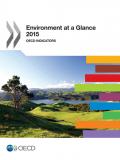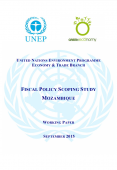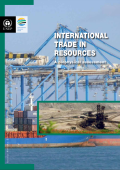
Environment at a Glance 2015 updates key environmental indicators and relevant socio-economic and sectoral indicators to track OECD country progress on major environmental issues and inform policy development and evaluation. This year's edition includes increased coverage of environmentally related taxation, ODA and R&D expenditure.

Mozambique faces a range of environmental challenges and risks, including deforestation; declining fish stocks; land, water and air pollution; and loss and degradation in wetlands and rivers ,which could all be compounded by climate change and a growing population.
The focus of this report is to identify policy options for Green Fiscal Reform (GFR) in Mozambique. These policy options include the use of taxation and pricing measures, which raise revenues or lower expenditures, while furthering environmental goals by addressing environmental externalities and incentivizing green investment.
In addition to these policies, a range of viable GFR policy options that the government could consider were identified through research on the government’s environmental challenges and fiscal policy landscape, a national validation workshop, as well as a literature review and expert consultations on global best practices. These policy options could facilitate Mozambique’s green economy transformation by shifting behaviour and investment decisions, while concurrently helping to create fiscal space that could be used to promote social and green economy investments.

This report is an exploration of the role of international trade in increasing resource efficiency, reducing environmental impact and promoting equitable and inclusive growth. The value of international trade has increased over six-fold and its volume more than doubled between 1980 and 2010. This report examines upstream resource requirements - the materials, energy, land and water used in the country of origin for producing traded goods, but left behind as wastes and emissions. It focuses more on environmental efficiency than on economic efficiency, and explains how trade could be resource efficient by allowing commodities to be obtained from countries/locations where their production requires fewer resources and generates fewer environmental impacts than in others. However, as the publication underlines, higher trade levels, declining ore grades and decreasing energy returns upon energy investment, higher food demand and diminishing land productivity further increase the upstream resource requirements of trade, which could negate the benefits of a potentially more resource efficient allocation of extraction and production activities via world trade.
While South Africa is the second largest economy in Africa and has a relatively high GDP per capita, poverty, (youth) unemployment, inequality, food insecurity and environmental degradation are some of the greatest challenges faced by the country. Evidence shows that social and environmental enterprises that apply green and inclusive business models can play a significant role in addressing those challenges on the ground, and in turn, in achieving sustainable development. The National Sustainable Development Strategy highlighted the role of SMMEs, the informal sector and gender in a green economy in development. It is essential for policy makers to understand the impact of those enterprises and how their scale-up can be promoted through policy interventions. This report provides case studies in South Africa and highlights the social, economic and environmental impacts (Triple Bottom Line impacts) delivered by these enterprises, namely:
This report reviews trends and progress on climate change mitigation policies in 34 OECD countries and 10 partner economies (Brazil, China, Colombia, Costa Rica, Indonesia, India, Latvia, Lithuania, the Russian Federation and South Africa), as well as in the European Union. Together, these countries account for over 80% of global GHG emissions. It covers three areas: 1) mitigation targets and goals, 2) carbon pricing instruments (such as energy and carbon taxation, emissions trading systems, as well as support for fossil fuels) and 3) key domestic policy settings in the energy and other sectors (including renewable energy, power generation and transport, innovation and R&D, and mitigation policies in agriculture, forestry, industry and waste sectors). The report is accompanied by an online country profiles tool containing more detailed information.
